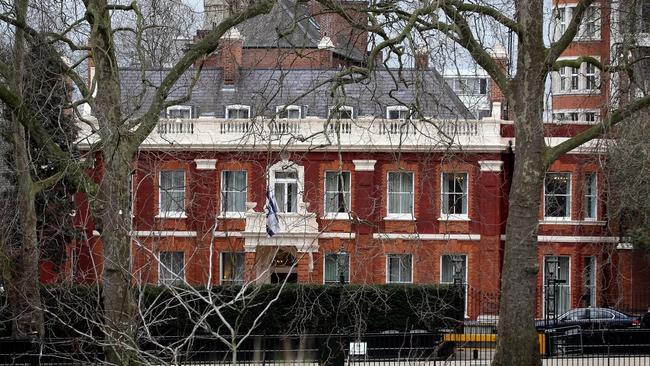Iranian terror suspects ‘targeted Israeli embassy in London’
Five Iranian nationals were arrested early this week, suspected of planning an atrocity at the embassy in Kensington, west London.

The Israeli embassy was the target of a terror plot linked to Iran, The Times has learnt.
A group of Iranian men are suspected of planning an atrocity at the embassy in Kensington, west London.
Counter-terrorism officers, supported by the military, swooped in to make arrests at the weekend fearing that an attack was imminent.
Yvette Cooper, the home secretary, said that it was one of the biggest counter-terrorism operations in recent years.
Five Iranian nationals were arrested on suspicion of preparation of an act of terrorism in a series of raids. Police have refused to publicise details of the alleged plot but it is understood the embassy was the main target.
Video showed armed counter-terrorism police and military personnel raiding a property in Rochdale, Greater Manchester, before dragging out one of the suspects. The other men were arrested in Swindon, west London, Stockport and Manchester.
Four men, aged between 29 and 46, are in custody being questioned. A fifth, aged 24, has been bailed.
Dan Jarvis, the security minister, refused to give details of the immigration status of the suspects citing the continuing police inquiry.
Three other men, also from Iran, were arrested on the same day in a separate operation. They were arrested under the National Security Act and are being questioned over allegations that they were working on behalf of a foreign state, understood to be Iran.
Last month a 33-year-old man was charged with preparation of terrorist acts after allegedly attempting to break into the Israeli embassy in west London. That case is understood to be unrelated to these arrests.
Security officials have repeatedly warned of the increased threat from Iran and acknowledged that international tensions could result in violence on the streets of the UK.
In October Sir Ken McCallum, the head of MI5, said that Iran could focus on UK targets if Tehran felt that Britain had become a party to the conflict in the Middle East by supporting Israel.
Since January 2022, police and MI5 have disrupted more than 20 Tehran-linked assassination and kidnap plots in Britain against dissidents and media organisations.
It comes as tensions rise again in the Middle East after Binyamin Netanyahu announced plans this week to “conquer” Gaza, threatening to displace millions of Palestinians.
Since the October 7 terror attacks, Israel has weakened Iranian influence in Lebanon, Gaza, Syria, Yemen and elsewhere.
The leadership of Hezbollah, the Iranian-backed militia in Lebanon, was dismantled by an audacious Israeli plot involving booby-trapped pagers in September. A few weeks later, the group’s leader, Hassan Nasrallah, was killed in an Israeli air strike on Beirut, prompting Iran to fire ballistic missiles and drones at Israel, bringing the Middle East to the brink of regional war.
Ismail Haniyeh, the political head of Hamas, was assassinated in Tehran in July and the Houthis, a Shiite militia in Yemen, have suffered heavy bombing from US and Israeli fighter jets in recent weeks after launching regular missile attacks on Tel Aviv and raids on commercial shipping in the Red Sea.
Yet despite the setbacks to Iran’s “axis of resistance”, Tehran is closer than ever to building a nuclear bomb.
President Trump has initiated talks with Iran to try to curb Tehran’s nuclear program in exchange for sanctions relief after reportedly dropping plans to bomb the country’s atomic facilities.
Israeli air strikes destroyed much of Iran’s air defences last year, paving the way for US attacks. However, Iran’s nuclear facilities are buried deep below ground and it is unclear if even the most powerful bombs in the US arsenal could penetrate so far underground.
The Times



To join the conversation, please log in. Don't have an account? Register
Join the conversation, you are commenting as Logout